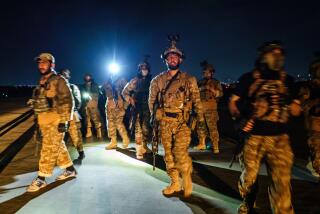A Nation in Need of Inclusive Rule
- Share via
WASHINGTON — The United Nations’ top strategist on Afghanistan said Saturday that a post-Taliban government must be acceptable to most of the country’s 25 million people, not just to representatives of the Taliban regime or the armed factions that are fighting it.
“Whatever arrangements are made need to be owned by the people of Afghanistan; otherwise, it will not work,” Lakhdar Brahimi told reporters in Washington one day after meetings with Vice President Dick Cheney and other top Bush administration officials.
Brahimi also rejected charges from some nongovernmental aid organizations that U.S. bombing operations in Afghanistan have made it impossible to feed the country’s starving people. He said the humanitarian situation is grave but is not much worse than it was before the bombing began Oct. 7.
“We think there are millions of people at risk, not because of the bombing campaign but because of the drought and the civil war,” Brahimi said.
At the same time, Brahimi, one of the United Nations’ top experts on peacekeeping forces, shrugged off the administration’s preferred solution for keeping order in a post-Taliban Afghanistan: a multinational force from mostly Islamic countries, probably led by Turkey.
“I’m yet to be convinced that you need to verify religion for participation in United Nations activities,” the Algerian envoy said.
But he acknowledged that some sort of peacekeeping force will be required. Although he said it is too early to determine the composition of such a force, he suggested that the United States and Britain--the leaders of the current military campaign--should not contribute troops.
“We are not talking about a force yet,” he said.
Brahimi said he will visit the region soon, perhaps within a week. He said every country bordering Afghanistan must be consulted.
Brahimi said creating a broad-based interim government is vital if the world community hopes to see a peaceful and stable Afghanistan. He said the world must not repeat the mistake it made more than a decade ago when it neglected Afghanistan’s needs after the fall of a government installed by the Soviet Union.
He said every country has an interest in Afghanistan’s future because “80% of the drugs sold on the high streets of European countries comes from Afghanistan. As soon as you have a government, this will stop. It will not stop before that.”
While acknowledging that he doesn’t yet know how an interim government might be established, Brahimi said it shouldn’t be dominated by either the extremist Islamic Taliban or the opposition Northern Alliance. Although the alliance, which the Taliban ousted from power in 1996, continues to hold Afghanistan’s seat at the United Nations, Brahimi said it should be regarded as no more than one of many parties with stakes in the country’s future.
“We are very familiar with them, and we will be talking to them,” he said of the alliance, a coalition of minority tribes and ethnic groups.
He strongly implied that the Taliban must be removed entirely.
“Those who call themselves a government are clearly unacceptable to the majority of the people of Afghanistan,” he said.
“If you want to stop a war, you have to talk to the people that are waging that war,” he said in reference to the Taliban, the Northern Alliance and some smaller rebel groups. “But if you want to do reconstruction, you have to talk to a much larger group.”
More to Read
Get the L.A. Times Politics newsletter
Deeply reported insights into legislation, politics and policy from Sacramento, Washington and beyond. In your inbox twice per week.
You may occasionally receive promotional content from the Los Angeles Times.










